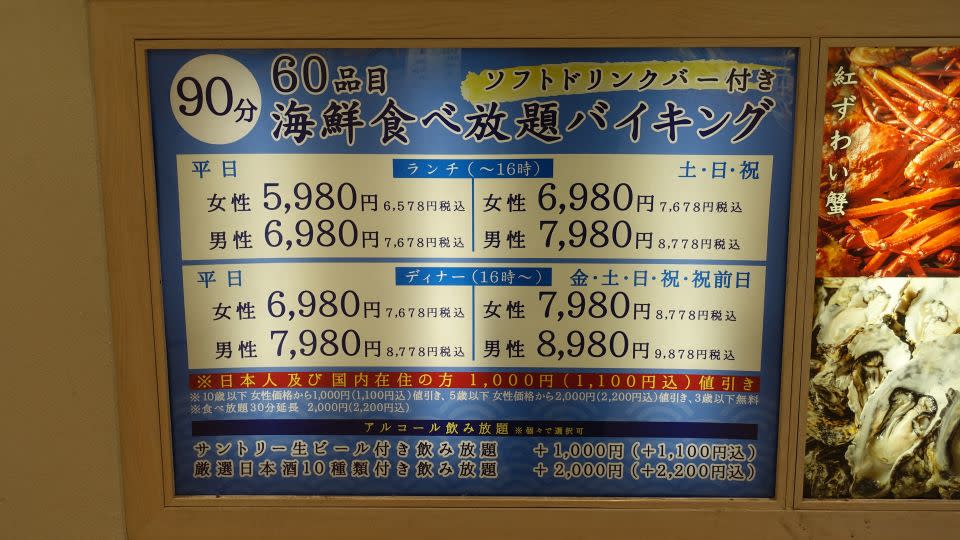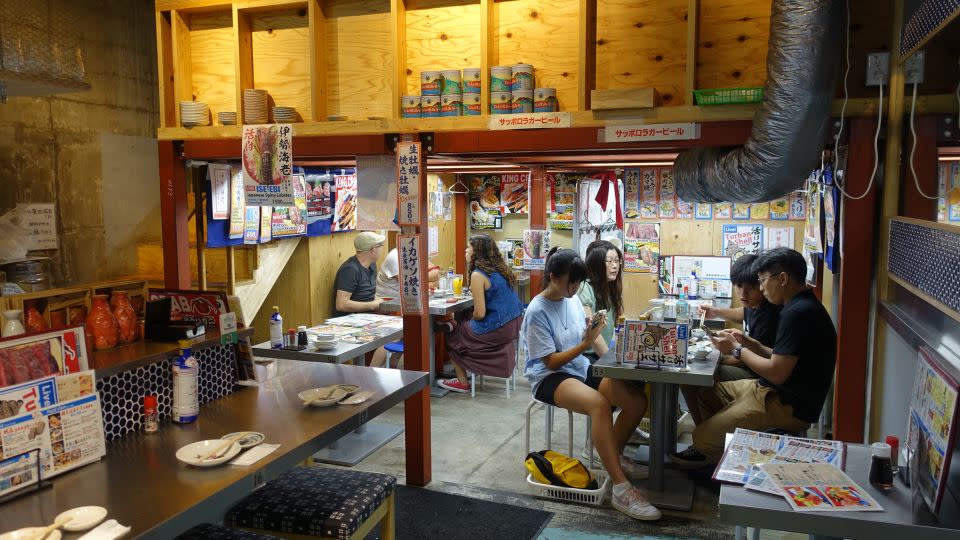Congratulations to you if you can speak Japanese perfectly and order food at a neighborhood sushi bar in Tokyo.
If you can, chances are that on your next trip to Japanyou may be able to get a better deal by blending in as a local.
Japan has never been a destination known for raising prices for foreigners. But overtourism – fueled by a combination of pent-up demands post-Covid (aka “revenge trip”) and the weak local currency – has recently led the country’s restaurants to consider the merits of differentiated prices.
“People say it’s discrimination, but it’s very difficult for us to serve foreigners and it’s beyond our capacity,” said Shogo Yonemitsu, who runs Tamatebako, an all-you-can-eat seafood restaurant. ShibuyaTokyo’s bustling shopping district.
He states that he does not charge tourists extra. Instead, he offers a 1,000 yen ($6.50) discount to locals.
“We need (this pricing system) for cost reasons,” Yonemitsu said.
Japan only fully reopened in fall 2022 following the removal of pandemic travel restrictions.
This year, driven by a weak yen that fell to its lowest level against the dollar in decadestourists are back – in large numbers.
Visitor arrivals to Japan hit a record 17.78 million in the first half of 2024, according to government data — and are on track to break the country’s 2019 record of 31.88 million tourists.
In response, places across the country have begun implementing tourist taxes, imposing maximum visitor limits and even banning the sale of alcohol in an attempt to reduce the effects of overtourism.
Earlier this year, a tourist town at the foot of Mount Fuji erected a giant network to block views of the iconic peak after tourists flocked to one spot to view photos, causing litter and traffic problems.
Meanwhile, tourism authorities in Hokkaido, the country’s northernmost province known for its scenic views and ski resorts, this month urged companies to set lower prices for locals.
And a mayor in western Japan said he was considering charging foreign tourists more than six times the local entrance fee to the UNESCO World Heritage-listed Himeji Castle.
Elisa Chan, associate director of the hospitality research center at the Chinese University of Hong Kong, said tiered pricing could be an effective way to combat overtourism.
“The owner may want to ensure that the sudden increase in tourist demand does not drive away all of their loyal and frequent local customers. Charging tourists more could be seen as a solution to this,” she said.

Yonemitsu, the restaurant owner, said the influx of tourists is not simply a matter of adding extra tables.
He said his seafood steakhouse has had to hire additional English-speaking staff to take orders, handle reservations and explain everything to tourists, from how to tell the difference between sashimi and grilled foods to where to put their luggage. Failure to do so results in “chaos,” he said.
“Some people say, ‘We don’t do that in our country.’ But think about how bad Japanese people’s English skills are. We are not yet at that level where we can consider ourselves a tourist powerhouse. We simply don’t know how to speak English and yet we can’t say the wrong things. It’s very stressful,” he said.
Although it is a new phenomenon in Japan, differentiated prices are quite common in other parts of the world. As the cheapest prices for residents are often written in the local language, foreign tourists may not even know they have paid more.
In Japan, it is up to each company to decide for themselves whether they want to implement two-tier pricing. This is not always the case elsewhere, as governments can intervene.
In Venicefor example, authorities introduced a fee to enter the Italian city and an online reservation system to cope with overtourism.
Meanwhile, some Japanese entrepreneurs are trying to get creative.


Shuji Miyake, who runs an izakaya, or informal pub, in Tokyo’s Tsukiji district, offers ramen topped with lobster for 5,500 yen ($35) — four times the price of the shrimp noodles his regulars usually order. The premium dish is marketed to tourists, who he says have a bigger budget to try new things.
Australian tourist Phoebe Lee said she spent less on a recent two-week trip to Japan than on her previous trips to the country – and that she wouldn’t mind paying a little more if the weak yen is making life difficult for locals.
“This helps support local businesses to continue providing lucky visitors with incredible experiences and preserving important parts of Japan’s culture, like small family restaurants or authentic ryokans (traditional inns),” she said.
CNN’s Junko Ogura contributed reporting.
For more news and newsletters from CNN, create an account at CNN.com































